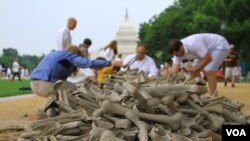WASHINGTON, D.C. —
Thousands of anti-genocide activists dressed in white placed more than a million artificial bones on the National Mall in front of the U.S. Capitol this past weekend, to draw attention to atrocities being committed in Africa and around the world.
On Monday, more than 200 activists, including Benjamin Kashira, lobbied U.S. lawmakers.
“I urge all Congress here in Washington to do something about Sudan and the eastern Congo,” Canadian resident Benjamin Kashira, a native of the restive eastern part of the DRC, said. “Otherwise, this is going to be a holocaust."
Kashira was on Capitol Hill as part of “Act Against Atrocities Day," in which participants urged some 50 members of Congress to approve pending bipartisan legislation that would hold human rights violators accountable, invest in a comprehensive peace process, and support democracy-building in Sudan and the DRC.
The lobbying effort was organized by the Enough Project, a Washington, D.C.-based anti-genocide advocacy group, while the "One Million Bones” installation served as the backdrop for its message.
Mark Hackett of Memphis, Tennessee, said he left culinary arts school to work full-time to eliminate genocide in Africa six years ago after meeting a refugee from Darfur, the troubled region in western Sudan where the United Nations has said at least 300,000 people may have died in 10 years of conflict.
“Having been to Sudan myself a year ago and having seen all the devastation, that’s enough to move you,” said Hackett, who is now the CEO of the Sudan advocacy group Operation Broken Silence.
“But I think that when you meet the people there and they still have hope despite living under this government for you know, 20-plus years now, if they can have hope, then I think we can, too.”
Akshaya Kumar, a Sudan policy analyst with the Enough Project, said she hopes that the activists' calls will spur lawmakers into action.
“By bringing constituents’ voices to the Hill, and saying that people – not just activists from the Enough Project but average people -- care about these issues, we hope that Congressmen are going to be more engaged and active, and the American government will play an important role in finding foreign policy solutions,” Kumar said.
Pennsylvania native Stacey Camelli doesn't have much activist experience, but after reading about the genocide in Rwanda, she became interested. She was lobbying Congress for the first time this week.
“I think it’s responsibility,” she said. “You can’t just watch these things happen to people, whether it’s local or it’s over in Sudan or the Congo. You just have to get involved and start somewhere. And this is my starting place.”
According to the United Nations High Commissioner for Refugees (UNHCR), there are 2.3 million internally displaced persons, some 140,000 refugees, 7,000 asylum-seekers and an estimated hundreds of thousands of people at risk of statelessness within Sudan.
UNHCR says that more than 2.2 million people have been displaced in the DRC since the beginning of 2012 after ethnic tensions and inequitable access to land in the east and northeast areas of the country led to renewed violence.
On Monday, more than 200 activists, including Benjamin Kashira, lobbied U.S. lawmakers.
“I urge all Congress here in Washington to do something about Sudan and the eastern Congo,” Canadian resident Benjamin Kashira, a native of the restive eastern part of the DRC, said. “Otherwise, this is going to be a holocaust."
Kashira was on Capitol Hill as part of “Act Against Atrocities Day," in which participants urged some 50 members of Congress to approve pending bipartisan legislation that would hold human rights violators accountable, invest in a comprehensive peace process, and support democracy-building in Sudan and the DRC.
The lobbying effort was organized by the Enough Project, a Washington, D.C.-based anti-genocide advocacy group, while the "One Million Bones” installation served as the backdrop for its message.
Mark Hackett of Memphis, Tennessee, said he left culinary arts school to work full-time to eliminate genocide in Africa six years ago after meeting a refugee from Darfur, the troubled region in western Sudan where the United Nations has said at least 300,000 people may have died in 10 years of conflict.
“Having been to Sudan myself a year ago and having seen all the devastation, that’s enough to move you,” said Hackett, who is now the CEO of the Sudan advocacy group Operation Broken Silence.
“But I think that when you meet the people there and they still have hope despite living under this government for you know, 20-plus years now, if they can have hope, then I think we can, too.”
Akshaya Kumar, a Sudan policy analyst with the Enough Project, said she hopes that the activists' calls will spur lawmakers into action.
“By bringing constituents’ voices to the Hill, and saying that people – not just activists from the Enough Project but average people -- care about these issues, we hope that Congressmen are going to be more engaged and active, and the American government will play an important role in finding foreign policy solutions,” Kumar said.
Pennsylvania native Stacey Camelli doesn't have much activist experience, but after reading about the genocide in Rwanda, she became interested. She was lobbying Congress for the first time this week.
“I think it’s responsibility,” she said. “You can’t just watch these things happen to people, whether it’s local or it’s over in Sudan or the Congo. You just have to get involved and start somewhere. And this is my starting place.”
According to the United Nations High Commissioner for Refugees (UNHCR), there are 2.3 million internally displaced persons, some 140,000 refugees, 7,000 asylum-seekers and an estimated hundreds of thousands of people at risk of statelessness within Sudan.
UNHCR says that more than 2.2 million people have been displaced in the DRC since the beginning of 2012 after ethnic tensions and inequitable access to land in the east and northeast areas of the country led to renewed violence.




